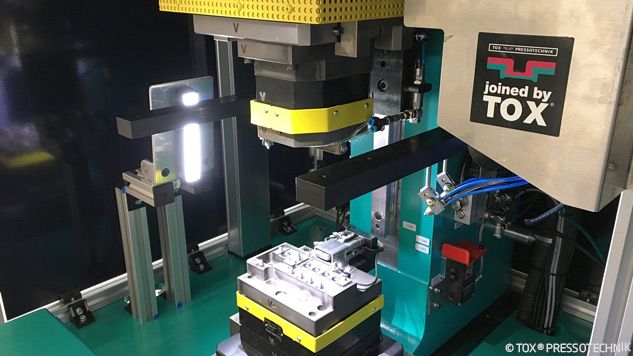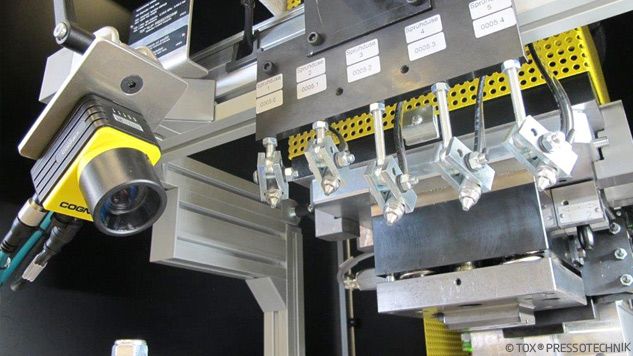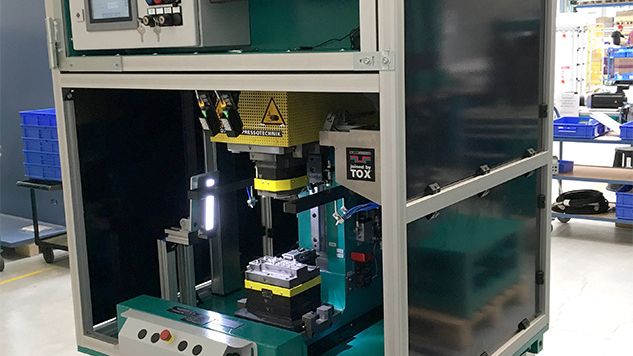These days, cars house a multitude of sensors, actuators and control units. After all, assistance, entertainment and air conditioning systems have to function at the touch of a button or completely automatically to ensure comfort and safety. The task of the main fuse box is to supply each electrical consumer with the respectively necessary potential. Knipping Kunststofftechnik is an expert for such technically complex plastic assemblies, which usually consist of thermoplastic and duroplastic as well as metal inserts in part.
A functional component of the fuse box is a power rail with five fuses – both from highly conductive copper sheets of different thickness. Knipping attached the fuses in two stages: First of all, the individual elements had to be punched and then screwed on – a complex process, which also affects the current flow in the joint. While searching for a more efficient procedure, the supplier came across the joining technologies from TOX® PRESSOTECHNIK.
“eClinching is based on our proven clinching technology and has the advantage amongst others to maintain conductivity in the joint, without an auxiliary element like a screw obstructing the flow”, says Stefan Zauner, from technical sales at TOX® PRESSOTECHNIK GmbH & Co. KG. The reason: During the press-pull process, the surfaces and material structures remain intact, which keeps the electrical resistance in the clinch point low.
“If the material surface is not damaged, coatings, for example for protecting against corrosion, also remain intact”, says Zauner. Clinching is an efficient solution to join sheet metals to each other permanently. The procedure here is highly flexible with regard to sheet metal thickness, quality and surface. Several layers as well as different materials can be reliably joined together. “eClinching is a version of clinching with a few special features. For example, the choice of clinch point shape is crucial, to create a permanently conductive joint”, says the technical sales man.
“We have known TOX® PRESSOTECHNIK from other projects already. When we talked to experts in-depth at a trade fair, we became even more aware of the advantages of eClinching specifically”, says Jens Bauer, head of application technology at Knipping Kunststofftechnik GmbH. Knipping decided on this procedure.
TOX®-Press - compact with camera & process monitoring
Following detailed consultation, in which parameters and requirements amongst others of process monitoring were aligned, the plastic specialist ordered a TOX®-Press with a tool for setting five TOX®-Round Joints at the same time. The compact TOX®-Powerpackage of type X-K supplies the power, which builds a maximum press force of around 320 kN at six bar of compressed air. The total stroke is at 200 mm, of which 12 mm are pure power stroke. Separate tool guidance is superfluous, as Knipping chose a press frame of the CMB series. TOX® PRESSOTECHNIK manufactures this by default with a tool ram guided in linear bearings. The throat depth is approx. 150 mm.
“The quality requirements are very high in automotive engineering. For this reason, we were looking for a system which monitors and documents the process independently”, says Jens Bauer. TOX® PRESSOTECHNIK added a camera to the press as well as the process monitoring CEP 400T, which was developed specifically for the clinch procedure.
It monitors the X-dimension, i.e. the residual bottom thickness in the clinch point, and documents the force-process characteristic. Due to the controlled X-dimensions as well as the press force, statements can also be made about the type of material and the correct tool combination, the sheet strength as well as thickness and number of sheets. A message is also issued if a sheet is missing or another fault is present. “This also ensures and documents the conductivity of each electrical connection – which will be non-destructive during the process”, says Stefan Zauner.
The camera with color detection already monitors the position and color types of the different fuses before clinching. If it detects a faulty part, the press remains closed, until the operator releases it again by means of a key switch. “This way, we are absolutely certain to obtain accurate results”, says the head of application technology.
TOX® PRESSOTECHNIK also makes sure that the process works safely for Knipping with preparatory work in the in-house laboratory. “Here, we determine the most effective solution, carry out preliminary tests with the samples provided and check the samples”, says Mr Zauner. Parameters like the required press force or the correct tool combination are also determined and documented.
“From project planning and acceptance up to commissioning, everything worked smoothly without major issues”, says Jens Bauer about the cooperation with TOX® PRESSOTECHNIK. And the result also speaks for itself: “The new joining process is clearly more effective, and the compact system monitors the quality 100 percent non-destructively even during the production process.”




























